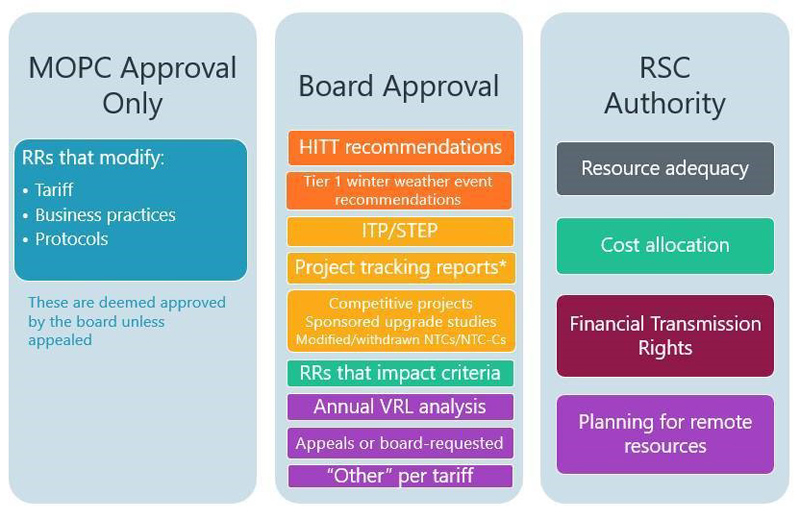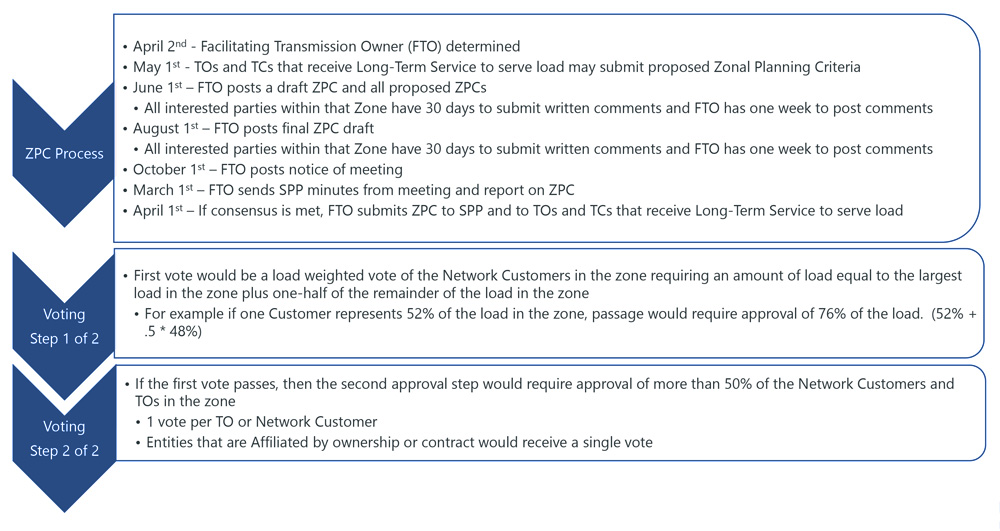SPP’s Board of Directors and its state regulators this week will consider a pair of transmission revision requests that did not pass stakeholder muster earlier this month over cost-allocation and equity concerns.
The Regional State Committee, comprising regulators from the RTO’s footprint, will vote Monday on a measure (RR483) to address FERC-identified deficiencies in the grid operator’s byway facility cost-allocation process. The RSC has primary authority over cost allocation for SPP-directed transmission projects; any methodology allocating costs that the committee approves must be filed at FERC according to the RTO’s
bylaws.
On Tuesday, the board will consider that and RR477, which establishes uniform local planning criteria within each transmission pricing zone and has also been rejected in its previous form by the commission.
Both measures came within 3 percentage points of SPP’s 66% majority approval threshold during the Jan. 10-11 Markets and Operations Policy Committee. Transmission owners split 6-6, with five abstentions, on RR483 and favored RR477 9-7; transmission users favored the change requests 30-8 and 27-12, respectively.

The Strategic Planning Committee endorsed both RR483 and RR477 during its Jan. 12 meeting by 10-4 and 11-2 (with an abstention) margins, respectively.
Under SPP’s bylaws, the board has independent authority over all RTO matters and it can approve a revision request, even if it is rejected by MOPC or another committee.
Both measures were among 21 recommendations from the Holistic Integrated Tariff Team in 2019, intended to integrate increased renewable energy, boost reliability, and improve transmission planning and the wholesale market. SPP General Counsel Paul Suskie told MOPC that all HITT recommendations must go the board for final approval. (See SPP Board Approves HITT’s Recommendations.)
“There are a lot of very entrenched opinions on this,” said John Krajewski, who consults for the Nebraska Power Review Board and led the Cost Allocation Working Group’s (CAWG) work on the subject. “If you’re not expecting opposition at FERC, you’re kidding yourself.”
The CAWG drafted a white paper in response to HITT’s recommendation to “evaluate creating a narrow process through which costs for specific projects between 100 and 300 kV can be fully allocated prospectively on a regionwide basis.” The document was approved by the board and RSC in July 2020, leading to tariff language that was filed at FERC.
Under SPP’s highway/byway methodology, transmission costs are allocated on a voltage threshold basis. Highway facilities, or those above 300 kV, are allocated 100% on regional, postage-stamp basis. Byway facilities, those between 100 and 300 kV, are allocated on a regional basis (33%) and to the pricing zone (67%) in which the facilities are located. Facilities at or below 100 kV are fully allocated to the zone in which they are located.
However, the commission rejected SPP’s filing last June without prejudice, finding that the proposal gave too much discretion to the board in allocating costs and did not include clear standards for making decisions. (See FERC Rejects SPP’s Cost-allocation Waiver Proposal.)
RR 483 responds to the filing with a “surgical approach” to evaluate byway projects in wind-rich zones. It allows a byway-funded transmission upgrade to be funded through a regionwide allocation after meeting certain criteria under the “narrow review process.” Projects eligible for this “narrow and limited process” must have base plan upgrade costs eligible for cost allocation under the SPP tariff.
Members in wind-rich pricing zones have long complained their small system loads have been unfairly saddled with costs for exporting largely unaffiliated generation. They argue the process should take regional benefits into consideration.
“Seventy, 80% of the time we’re exporting to SPP. We encourage SPP to continue working on a solution,” said Sunflower Electric Power Cooperative’s Al Tamimi, who has frequently asked for support for his zone, during the MOPC discussion.
Oklahoma Gas & Electric’s Usha Turner said SPP’s regional cost allocation review (RCAR) process provides a remedy “to resolve grievances around cost” and pointed to FERC Commissioner Mark Christie’s dissent. Christie said SPP’s previous application provided “insufficient detail” with respect to the various roles of stakeholder groups, states and load-serving entities in reviewing the waiver requests.
“I think this is going to make its way back to SPP, because I don’t think we’ve resolved FERC’s concerns,” Turner said before voting against the change.
“The RCAR uses lot of hypothetical assumptions,” Tamimi said. “It’s not used for cost allocation.”
“This is a waiver process that [an entity] is going to have to go through lots of hoops and hurdles when a wind-rich zone wants something considered,” said Golden Spread Electric Cooperative’s Mike Wise, a proponent of the measure. “We don’t want something crammed down. This surgical approach is ideally suited for what we’ve been trying to resolve over the last five years. This is an effective, appropriate approach to alleviate or allow a process to help a zone that has surely been harmed by our tariff in this way.”
FERC also rejected RR477’s previous iteration in 2020, siding with stakeholders who argued the proposal would give a pricing zone’s facilitating TO ”unilateral power” and “unduly” benefit them and the zone’s largest network load customer. GridLiance High Plains, Tri-County Electric Cooperative, Kansas Power Pool and a group of eight cooperatives argued the proposal would allow a single customer, based on the size of its load, to dictate planning criteria for everyone else in the zone. (See FERC Rejects SPP’s Zonal Planning Criteria.)

RR477 retains the facilitating TO concept but introduces a formal process to influence its decision-making in establishing the zonal planning criteria. SPP staff said the measure also establishes an avenue to ensure input from the zone’s other TOs, customers and stakeholders is considered and add a two-step voting process.
Some stakeholders have pushed back, saying the new language is overly burdensome on the FTO and includes hard dates that are inflexible. They said a requirement to perform the exercise annually is not in reliability planning’s best interest.
Evergy said in its comments that the “one-size-fits-all” approach includes rigid vote procedures in two early steps and weights that are not equitable in zones where the largest TO also has a clear majority of the load. The utility said local planning would cease to exist in transmission zones that don’t reach consensus because the planning criteria does not identify a zonal reliability upgrade.
“Status quo is not an answer,” Southwestern Public Service’s Bill Grant said at MOPC. “I think SPP will tell you there’s a lot of different TOs and each one has different criteria in each zone. That gets to be where it’s not workable.”
MOPC’s members suggested entities send their specific concerns to Evergy’s Denise Buffington, the committee chair. She said her company’s reliability concerns have not yet been addressed, but that work underway “could push the Evergy team over to support the proposal.”
“We’ll have that debate and dialogue at the board meeting,” she said.
“We’re close. We’re going to see if we can’t close that gap in the next two weeks,” American Electric Power’s Richard Ross said at MOPC. “We’d like to get this taken care of at the board.”
Heather Starnes, who represents Missouri Joint Municipal Electric Utility Commission, an alliance of municipalities, said RR477 is not perfect, “but it’s a good start.”
“If we can bolster SPP’s criteria to make people comfortable, we’d like to do that,” she said. “I don’t think we’ll make everybody happy.”
Starnes was part of a sub-team with Ross, Wise and Grant working to resolve differences between TOs and the protesting groups on RR477.
“Everybody understands it’s a great thing to work together on consensus,” Grant said. “There are some situations where people don’t agree, but that doesn’t tie your hands. I do agree a lot of good work has gone into [RR477] that addresses FERC’s concerns.”




